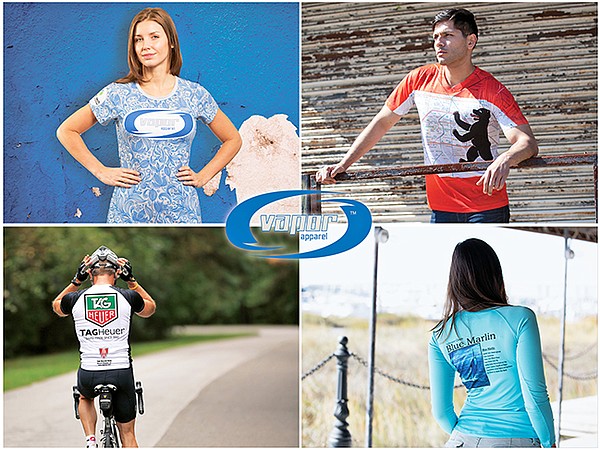MANUFACTURING
Vapor Apparel Opening New Cut-and-Sew Facility to Meet Made-in-America Demand
South Carolina–based Vapor Apparel, a provider of digital print-on-demand services and performance apparel manufacturing, is growing fast. The company saw sales rise by 30 percent in 2014 and company management projects another 20 percent in 2015.
So, to help meet this growing demand, Vapor, which is headquartered in North Charleston, plans to open a new 48,000-square-foot cut-and-sew operation in Union County, the historically textile-oriented area in the north central part of the state. Cut and sew is a rapidly growing segment of Vapor’s manufacturing process. Vapor will also use the facility to expand its print-on-demand and e-commerce activity.
“If January is any indication, this will be another solid year,” said Chris Bernat, co-founder and chief revenue officer of the 11-year-old firm. “Our company has grown consistently year over year.”
Bernat, who founded the company with Jackson Burnett, who serves as president, said Vapor has evolved from being in the sublimation space 11 years ago to adding screen printing five years ago to adding full cut-and-sew operations two years ago. The company also owns a couple of retail brands, which Bernat said allows Vapor to act as its own supply chain. Burnett and Bernat are both graduates of Clemson University and both worked at Sawgrass Technologies, a North Carolina developer of digital-printing technologies, before founding Vapor.
“We started as a blanks company, and for five years we focused on producing high-quality garments for sublimation,” Bernat said. “We have a fabric that feels like cotton, and we have carved out a good mix of clients in the outdoor retail market, in the coastal market and in the athletic market.”
Vapor considered expanding in Charleston, even with its higher real estate costs, but Bernat said there is a lack of sewing resources in the area. “In Union County, we are as close as we can be to Charleston and still have the organic sewing skills we need.”
Charleston has become the top sublimation printing corridor in the U.S. outside of Los Angeles, Bernat said. “There is a good amount of activity in Charleston and in the Southeast in general,” he said. “There are a lot of paper and printer companies. There’s ink manufacturing and there are software engineers for sublimation here. Charleston has a very good pool of potential employees for all the things you need to do to be a brand such as marketing, customer service, creative content, graphic design and Web.”
Vapor serves four core markets: companies active in the sublimation print industry and in need of quality blanks; the coastal lifestyle markets, ranging from fishing tournaments to coastal retailers to paddle boarders on the beach (including UPF 50–rated fabrics); the outdoor retailer market; and print-on-demand companies.
E-commerce is a growing source of business for Vapor. Working through Amazon.com, Vapor does fulfillment for its brands. Bernat said Vapor hopes to eventually make print-on-demand services available out of both of the company’s South Carolina locations.
“A lot of our clients who have art who want to implement e-commerce don’t have the resources to do print on demand,” he said.
Vapor Apparel expects its Union County operations to come on line in the first quarter of 2015.
“For one customer, we do a six- to eight-day turnaround for made-in-the-USA cut-and-sew full sublimation,” Bernat said. “This turns into more of a just-in-time type of capacity and requires you to have a high level of customer service.”
All of Vapor’s printing is done in North Charleston. Cut-and-sew operations have been outsourced to a company in North Carolina the past two years, but Bernat said the volume reached a point where this operation needed to be brought in-house. Vapor sources its fabrics from a company in Colombia. The yarn comes from Colombian producers with some coming from the U.S. Vapor developed products using Unifi’s Repreve recycled yarns.
Having the printing and cut-and-sew operations in the U.S. gives Vapor’s products a made-in-the-U.S. aspect, which Bernat said is important to a growing end-user group of its products: millennials.
“The made-in-America distinction is becoming increasingly important,” Bernat said. “The millenials in the U.S. want this option. I was recently at a trade show where this was being emphatically reinforced.”






















